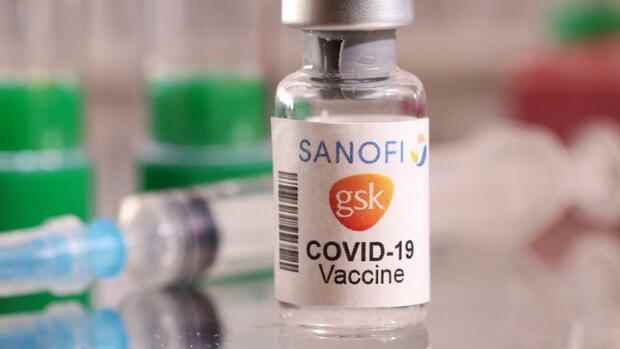With their vaccine, the pharmaceutical companies would only be number six in the largely divided market.
(Photo: Reuters)
Frankfurt After positive study data, the pharmaceutical companies Sanofi and Glaxo-Smithkline (GSK) now want to apply for approval for their jointly developed Covid vaccine. In the fight against the corona pandemic, a second protein-based vaccine should therefore be available in the course of the year.
In a study in which the Sanofi vaccine was used for boosters (boosters), the vaccine increased the antibody concentrations by 18 to 30 times compared to the initial situation, the two companies said on Wednesday.
In addition, Sanofi announced data for the use of the vaccine as a regular primary series of two doses three weeks apart. In a study with around 10,000 participants, the vaccine then showed an effectiveness of almost 58 percent against symptomatic Sars-CoV infections in general, 75 percent effectiveness against moderate or severe diseases and 100 percent protection against serious diseases and hospital admissions.
According to the French group, this corresponds to the effectiveness of the established vaccines in today’s environment, which is characterized by new virus variants. According to Sanofi, the antibody concentrations measured in the vaccinated were a good twice as high as in people who had received the mRNA vaccines. The vaccine has shown an advantageous safety profile in all age groups, both in primary vaccination and when used as a booster.
Top jobs of the day
Find the best jobs now and
be notified by email.
“We are very pleased with the data confirming our strong scientific base and the benefits of our Covid-19 vaccine,” said Thomas Triomphe, Head of Sanofi Vaccines Division. They are in talks with the regulatory authorities in the US and Europe and will now submit all the data.
Vaccine market is already well supplied
Sanofi and GSK are relatively far behind in the vaccine race and could only compete as number six in a market that is already well served. Their first product candidate had triggered too weak immune reactions in studies and therefore forced the two companies to start again.
The commercial potential of the Sanofi/GSK vaccine will therefore now depend to a large extent on the extent to which regular booster vaccinations are necessary and how strongly previous vaccine skeptics can now be convinced given the availability of protein-based vaccines.
The EU had already pre-ordered 300 million doses of the vaccine in 2020, but has since also signed an extended contract with Pfizer/Biontech for up to 1.8 billion doses. The US had pre-ordered 100 million doses from Sanofi.
So far, the two mRNA vaccines from Biontech/Pfizer and Moderna, vector vaccines from Astra-Zeneca and Johnson & Johnson and, more recently, the first protein-based vaccine from the US company Novavax have been approved in Europe. These companies are likely to have combined capacities for more than 10 billion doses this year, and Biontech/Pfizer and Moderna in particular already have large-scale fixed supply contracts with many countries on their books.
In their large clinical studies, the mRNA vaccines from Biontech and Moderna had shown significantly higher efficiencies of around 95 percent against symptomatic corona infections in general. However, they were tested in phases when the original version of the Sars-CoV-2 virus was still dominant, while other variants were already dominant at the time of the Sanofi studies.
In addition, they are rejected by vaccine skeptics who do not trust the comparatively novel genetic mechanisms of action of these vaccines. Politicians therefore hope to persuade at least some of the skeptics to vaccinate against Covid by offering protein-based vaccines.
With the protein vaccines, artificially produced fragments of the spike protein of the virus are injected together with vaccine enhancers, so-called adjuvants. These proteins are recognized as foreign by the immune system and trigger a defense reaction. The mRNA and vector vaccines, on the other hand, use genetic mechanisms to stimulate the body’s cells to produce the spike protein, which the immune system then responds to.
More: 100 billion dollars in additional sales: Corona boom brings record growth to pharmaceutical industry
